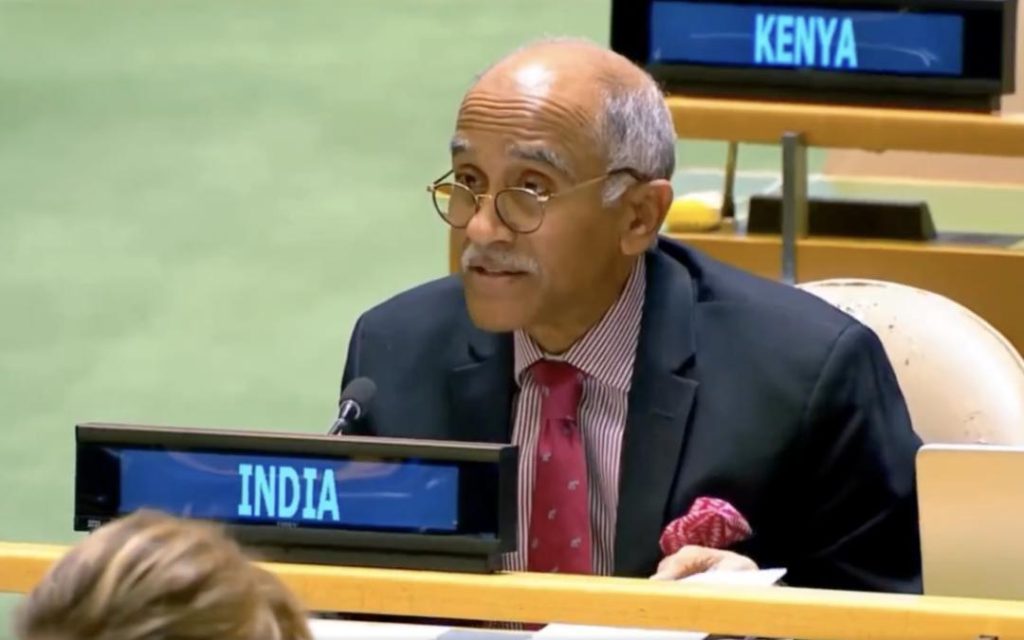
Pak’s Fanatical Mindset is Well Known: India on Pak’s Reference to J&K at UN
In a scathing rebuke, India’s Permanent Representative to the United Nations, Parvathaneni Harish, criticized Pakistan’s former Foreign Secretary’s statement on Jammu and Kashmir at the General Assembly, calling it “unjustified”. India’s strong reaction came in response to Pakistan’s repeated attempts to internationalize the Kashmir issue, which has been a long-standing point of contention between the two nations.
Pakistan’s former Foreign Secretary, who made the statement, claimed that the Kashmir issue is a “core dispute” between India and Pakistan, and that the international community should take notice of it. However, India’s Permanent Representative to the UN, Parvathaneni Harish, was quick to dismiss Pakistan’s claims, saying that such “frequent references” will not validate Pakistan’s claim or justify its “practice of cross-border terrorism”.
India’s strong reaction is not surprising, given the long-standing tensions between the two nations over the Kashmir issue. The region has been a flashpoint for several decades, with both India and Pakistan claiming sovereignty over it. The situation escalated further in 2019, when India revoked Article 370 of its constitution, which had granted special status to Jammu and Kashmir.
Pakistan has been trying to internationalize the Kashmir issue, claiming that India’s move was a violation of international law and human rights. However, India has consistently maintained that the Kashmir issue is a bilateral matter and that Pakistan has no locus standi in the matter.
India’s Permanent Representative to the UN, Parvathaneni Harish, made it clear that India will not be swayed by Pakistan’s attempts to internationalize the Kashmir issue. In his statement, he said, “The fanatical mindset of this nation (Pakistan) is well known. We will not be intimidated or influenced by such statements. We will continue to work towards peaceful resolution of the Kashmir issue, based on the principles of the Simla Agreement and the Lahore Declaration”.
The Simla Agreement and the Lahore Declaration are two important agreements between India and Pakistan, which outline the principles for resolving the Kashmir issue. The Simla Agreement, signed in 1972, emphasizes the need for peaceful resolution of the dispute through bilateral negotiations. The Lahore Declaration, signed in 1999, reiterates the commitment to resolve the Kashmir issue through peaceful means and to maintain the Line of Control (LoC) as a de facto border between the two countries.
India has consistently maintained that it is open to dialogue with Pakistan to resolve the Kashmir issue, but that Pakistan must first stop its support for cross-border terrorism and militant groups operating in the region. Pakistan, on the other hand, has maintained that it will not engage in talks with India until India withdraws its troops from Kashmir and lifts the curfew imposed on the region.
The Kashmir issue has been a major point of contention between India and Pakistan, with both countries accusing each other of human rights violations and terrorism. The situation has been further complicated by the presence of militant groups, such as the Jaish-e-Mohammed (JeM) and the Lashkar-e-Taiba (LeT), which have been responsible for several terrorist attacks in India.
In recent years, India has taken several measures to counter Pakistan’s support for terrorism, including the revocation of Article 370 and the introduction of the National Register of Citizens (NRC) in Jammu and Kashmir. India has also taken steps to strengthen its internal security, including the creation of the Border Security Force (BSF) and the Central Reserve Police Force (CRPF).
Pakistan, on the other hand, has been trying to internationalize the Kashmir issue, seeking support from the international community, including the United Nations, the European Union, and the Islamic world. Pakistan has also been trying to disrupt India’s efforts to resolve the Kashmir issue through peaceful means, including by supporting militant groups operating in the region.
In conclusion, India’s Permanent Representative to the UN, Parvathaneni Harish, has made it clear that India will not be intimidated or influenced by Pakistan’s attempts to internationalize the Kashmir issue. India will continue to work towards peaceful resolution of the Kashmir issue, based on the principles of the Simla Agreement and the Lahore Declaration. Pakistan must stop its support for cross-border terrorism and militant groups operating in the region and engage in meaningful dialogue with India to resolve the Kashmir issue.
Source:



